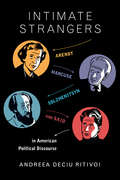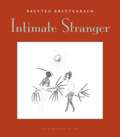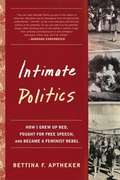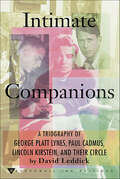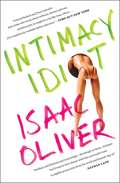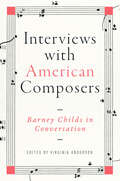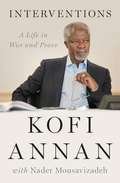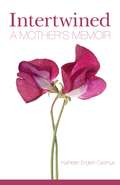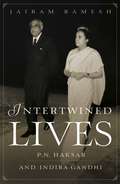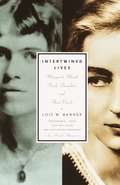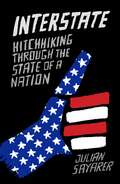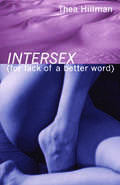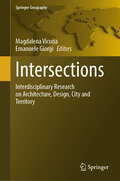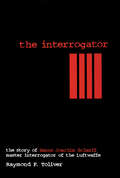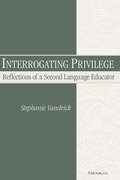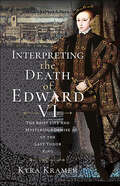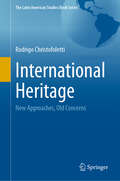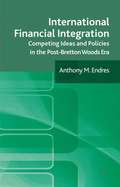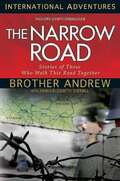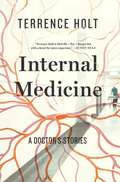- Table View
- List View
Intimate Strangers: Arendt, Marcuse, Solzhenitsyn, and Said in American Political Discourse
by Andreea Deciu RitivoiAndreea Deciu Ritivoi is professor of English at Carnegie Mellon University. Her research focuses on immigration, exile, political discourse, argumentation theory, and intellectual history. She is the author of Yesterday's Self: Nostalgia and the Immigrant Identity and Paul Ricoeur: Tradition and Innovation in Rhetorical Theory.
Intimate Stranger
by Breyten BreytenbachAddressed to a young writer, Intimate Stranger is an eclectic and generous work flowing with insight and wit. Breytenbach's candid and provocative reflections on reading and writing guide without guiding, open mental channels, surprise, and inspire. A stirring glimpse into the mind of an artist, Intimate Stranger is a river of experience and visions, brimming with sleights of tongue and overshifting in mood. This genre-defying gem makes manifest Einstein's assertion: "Example isn't another way to teach, it is the only way to teach.
Intimate Politics: How I Grew Up Red, Fought for Free Speech, and Became a Feminist Rebel
by Bettina F. ApthekerAt eight years old, Bettina Aptheker watched her family's politics play out in countless living rooms across the country when her father, historian and U. S. Communist Party leader Herbert Aptheker, testified on television in front of the House Un-American Activities Committee in 1953. Born into one of the most influential U. S. Communist families whose friends included W. E. B. Du Bois, Paul Robeson, and Elizabeth Gurley Flynn, Bettina lived her parents' politics witnessing first-hand one of the most dramatic upheavals in American history. She also lived with a terrible secret: incest at the hands of her famous father and a frightening and lonely life lived inside a home wrought with family tensions. Includes photos with captions.
Intimate Companions: A Triography of George Platt Lynes, Paul Cadmus, Lincoln Kirstein, and Their Circle
by David LeddickPhotographer George Platt Lynes, painter Paul Cadmus, and critic Lincoln Kirstein played a major role in creating the institutions of the American art world from the late 1920s to the early 1950s. The three created a remarkable world of gay aesthetics and desire in art with the help of their overlapping circle of friends, lovers, and collaborators.Through hours of conversation with surviving members with their circle and unprecedented access to papers, journals, and previously unreleased photos, David Leddick has resurrected the influences of this now-vanished art world along with the lives and loves of all three artists in this groundbreaking biography.
Intimacy Idiot
by Isaac OliverIn this uproariously funny debut collection, award-winning writer and performer Isaac Oliver serves up a comedic cornucopia of sketches, vignettes, lists, and diaries from his life as a young, fanciful, and extremely single gay man in New York City. Whether he's hooking up with a man who dresses as a dolphin, suffering on airplanes and buses next to people with Food From Home, or hovering around an impenetrable circle of attractive people at a cocktail party, Oliver captures the messy, moving, and absurd moments of urban life as we live it today. Since moving to New York a decade ago, Oliver has pined for countless strangers on the subway, slept with half the people in his Washington Heights neighborhood, and observed the best and worst of humanity from behind the glass of a Times Square theater box office. He also rode the subway during Breastfeeding Awareness Week and lived to tell the tale. Culled from years of heartbreak, hook-ups, and more awkwardness than a virgin at prom an a whore in church (and he should know because he's been both), Intimacy Idiot chronicles Oliver's encounters with love, infatuation, resilience, and self-acceptance that echo our universal desire for intimacy of all kinds.
Inthiya Ilakkiya Chirpikal: T. Janakiraman
by M. A. Mohammed HussainThis book is a monograph in Tamil on the life and writings of the popular Tamil novelist T. Janakiraman.
Inthiya Ilakkiya Chirpikal: Kavingnar Kannadhasan
by M. BalasubramanianA Monograph in Tamil on Kavingnar Kannadhasan, a Tamil poet and lyricist,popularly known as "Kaviarasu" (King of Poets) comprising his Biography, Personality, Poems and Other literary works etc. under eight chapters.
Interviews with American Composers: Barney Childs in Conversation (Music in American Life)
by Barney ChildsIn 1972-73, Barney Childs embarked on an ambitious attempt to survey the landscape of new American concert music. He recorded freewheeling conversations with fellow composers, most of them under forty, all of them important but most not yet famous. Though unable to publish the interviews in his lifetime, Childs had gathered invaluable dialogues with the likes of Robert Ashley, Olly Wilson, Harold Budd, Christian Wolff, and others. Virginia Anderson edits the first published collection of these conversations. She pairs each interview with a contextual essay by a contemporary expert that shows how the composer's discussion with Childs fits into his life and work. Together, the interviewees cover a broad range of ideas and concerns around topics like education, notation, developments in electronic music, changing demands on performers, and tonal music. Innovative and revealing, Interviews with American Composers is an artistic and historical snapshot of American music at an important crossroads.
Interventions: A Life in War and Peace
by Kofi Annan Nader Mousavizadeh"[A] resolute, detailed, and unflinching review of [Annan’s] most difficult hours…No one ever came closer to being the voice of “we the peoples” and no one paid a higher price for it. The world still needs such a voice, but the next person who tries to fill that role will want to reflect long and hard on the lessons of this candid, courageous, and unsparing memoir." --Michael Ignatieff, The New York Review of BooksReceiving the Nobel Peace Prize in December 2001, United Nations Secretary-General Kofi Annan spoke to a world still reeling from the terrorist attacks of September 11. “Ladies and Gentlemen,” proclaimed Annan, “we have entered the third millennium through a gate of fire. If today, after the horror of 11 September, we see better, and we see further—we will realize that humanity is indivisible. New threats make no distinction between races, nations, or regions.” Yet within only a few years the world was more divided than ever—polarized by the American invasion of Iraq, the Arab-Israeli conflict, the escalating civil wars in Africa, and the rising influence of China.Interventions: A Life in War and Peace is the story of Annan’s remarkable time at the center of the world stage. After forty years of service at the United Nations, Annan shares here his unique experiences during the terrorist attacks of September 11; the American invasions of Iraq and Afghanistan; the war between Israel, Hizbollah, and Lebanon; the brutal conflicts of Somalia, Rwanda, and Bosnia; and the geopolitical transformations following the end of the Cold War. With eloquence and unprecedented candor, Interventions finally reveals Annan’s unique role and unparalleled perspective on decades of global politics.The first sub-Saharan African to hold the position of Secretary-General, Annan has led an extraordinary life in his own right. His idealism and personal politics were forged in the Ghanaian independence movement of his adolescence, when all of Africa seemed to be rising as one to demand self-determination. Schooled in Africa, Europe, and the United States, Annan ultimately joined the United Nations in Geneva at the lowest professional level in the still young organization. Annan rose rapidly through the ranks and was by the end of the Cold War prominently placed in the dramatically changing department of peacekeeping operations. His stories of Presidents Clinton and Bush, dictators like Saddam Hussein and Robert Mugabe, and public figures of all stripes contrast powerfully with Annan’s descriptions of the courage and decency of ordinary people everywhere struggling for a new and better world.Showing the successes of the United Nations, Annan also reveals the organization’s missed opportunities and ongoing challenges—inaction in the Rwanda genocide, continuing violence between Israelis and Palestinians, and the endurance of endemic poverty. Yet Annan’s great strength in this book is his ability to embed these tragedies within the context of global politics, demonstrating how, time and again, the nations of the world have retreated from the UN’s founding purpose. From the pinnacle of global politics, Annan made it his purpose to put the individual at the center of every mission for peace and prosperity.A personal biography of global statecraft, Annan’s Interventions is as much a memoir as a guide to world order—past, present, and future.
Interventions
by Kofi Annan"[A] resolute, detailed, and unflinching review of [Annan’s] most difficult hours...No one ever came closer to being the voice of "we the peoples” and no one paid a higher price for it. The world still needs such a voice, but the next person who tries to fill that role will want to reflect long and hard on the lessons of this candid, courageous, and unsparing memoir. " --Michael Ignatieff, The New York Review of Books Receiving the Nobel Peace Prize in December 2001, United Nations Secretary-General Kofi Annan spoke to a world still reeling from the terrorist attacks of September 11. "Ladies and Gentlemen,” proclaimed Annan, "we have entered the third millennium through a gate of fire. If today, after the horror of 11 September, we see better, and we see further-we will realize that humanity is indivisible. New threats make no distinction between races, nations, or regions. ” Yet within only a few years the world was more divided than ever-polarized by the American invasion of Iraq, the Arab-Israeli conflict, the escalating civil wars in Africa, and the rising influence of China. Interventions: A Life in War and Peace is the story of Annan’s remarkable time at the center of the world stage. After forty years of service at the United Nations, Annan shares here his unique experiences during the terrorist attacks of September 11; the American invasions of Iraq and Afghanistan; the war between Israel, Hizbollah, and Lebanon; the brutal conflicts of Somalia, Rwanda, and Bosnia; and the geopolitical transformations following the end of the Cold War. With eloquence and unprecedented candor, Interventions finally reveals Annan’s unique role and unparalleled perspective on decades of global politics. The first sub-Saharan African to hold the position of Secretary-General, Annan has led an extraordinary life in his own right. His idealism and personal politics were forged in the Ghanaian independence movement of his adolescence, when all of Africa seemed to be rising as one to demand self-determination. Schooled in Africa, Europe, and the United States, Annan ultimately joined the United Nations in Geneva at the lowest professional level in the still young organization. Annan rose rapidly through the ranks and was by the end of the Cold War prominently placed in the dramatically changing department of peacekeeping operations. His stories of Presidents Clinton and Bush, dictators like Saddam Hussein and Robert Mugabe, and public figures of all stripes contrast powerfully with Annan’s descriptions of the courage and decency of ordinary people everywhere struggling for a new and better world. Showing the successes of the United Nations, Annan also reveals the organization’s missed opportunities and ongoing challenges-inaction in the Rwanda genocide, continuing violence between Israelis and Palestinians, and the endurance of endemic poverty. Yet Annan’s great strength in this book is his ability to embed these tragedies within the context of global politics, demonstrating how, time and again, the nations of the world have retreated from the UN’s founding purpose. From the pinnacle of global politics, Annan made it his purpose to put the individual at the center of every mission for peace and prosperity. A personal biography of global statecraft, Annan’s Interventions is as much a memoir as a guide to world order-past, present, and future. .
Intertwined: A Mother's Memoir
by Kathleen English Cadmus“…A heartfelt, brave, raw, yet hopeful journey of a mother’s loss and unconditional love.” - Shannon Hudson Johnson, Psy.D., clinical psychologistHow does a woman go from being a normal Midwestern mom to sitting across the table from a bounty hunter? That’s what Kathleen English Cadmus wondered as she took one more surreal step in her quest to find and save her teenage daughter, Laura.The beautiful baby Kathleen had adopted from Korea was on the run again, fueled by another manic episode brought on by her bipolar disorder.Having already lost her son Shawn to a tragic accident, Kathleen couldn’t bear the thought that she had failed to protect another one of her children.Intertwined: A Mother’s Memoir is a raw but loving tribute to the pain and beauty of motherhood—the story of a mother, a daughter, a son, two marriages, and the way all of those lives are at once distinct yet inseparable. Intertwined illustrates the way the people we love become part of us—become us—and show us who we truly are.
Intertwined Lives: P.N. Haksar & Indira Gandhi
by Jairam RameshThis is the first definitive biography of arguably India’s most influential and powerful civil servant: P.N. Haksar, Indira Gandhi’s alter ego during her period of glory. Educated in the sciences and trained in law, Haksar was a diplomat by profession and a communist-turned-democratic socialist by conviction. He had known Indira Gandhi from their student days in London in the late-1930s, even though family links predated this friendship. They kept in touch, and in May 1967, she plucked him out of his diplomatic career and appointed him secretary in the prime minister’s Secretariat. This is when he emerged as her ideological beacon and moral compass, playing a pivotal role in her much-heralded achievements including the nationalization of banks, abolition of privy purses and princely privileges, the Indo-Soviet Treaty, the creation of Bangladesh, rapprochement with Sheikh Abdullah, the Simla and New Delhi Agreements with Pakistan, the emergence of the country as an agricultural, space and nuclear power and, later, the integration of Sikkim with India. This power and influence notwithstanding, Haksar chose to walk away from Indira Gandhi in January 1973. She, however, persuaded him to soon return, first as her special envoy and later as deputy chairman of the Planning Commission where he left his distinctive imprint. Exiting government once and for all in May 1977, he then continued to be associated with a number of academic institutions and became the patron for various national causes like protecting India’s secular traditions, propagating of a scientific temper, strengthening the public sector and deepening technological self-reliance. Successive prime ministers sought his counsel and in May 1987, he initiated the reconstruction of India’s relations with China. He remained an unrepentant Marxist and one of India’s most respected elder statesman and leading public figures till his death in November 1998. Drawing on Haksar’s extensive archives of official papers, memos, notes and letters, Jairam Ramesh presents a compelling chronicle of the life and times of a truly remarkable personality who decisively shaped the nation’s political and economic history in the 1960s and 1970s that continues to have relevance for today’s India as well. Written in Ramesh’s inimitable style, this work of formidable scholarship brings to life a man who is fast becoming a victim of collective amnesia.
Intertwined Lives: Margaret Mead, Ruth Benedict and Their Circle
by Lois W. BannerA uniquely revealing biography of two eminent twentieth century American women. Close friends for much of their lives, Ruth Benedict and Margaret Mead met at Barnard College in 1922, when Mead was a student, Benedict a teacher. They became sexual partners (though both married), and pioneered in the then male-dominated discipline of anthropology. They championed racial and sexual equality and cultural relativity despite the generally racist, xenophobic, and homophobic tenor of their era. Mead's best-selling Coming of Age in Samoa (1928) and Sex and Temperament in Three Primitive Societies (1935), and Benedict's Patterns of Culture (1934), Race (1940), and The Chrysanthemum and the Sword (1946), were landmark studies that ensured the lasting prominence and influence of their authors in the field of anthropology and beyond.With unprecedented access to the complete archives of the two women--including hundreds of letters opened to scholars in 2001--Lois Banner examines the impact of their difficult childhoods and the relationship between them in the context of their circle of family, friends, husbands, lovers, and colleagues, as well as the calamitous events of their time. She shows how Benedict inadvertently exposed Mead to charges of professional incompetence, discloses the serious errors New Zealand anthropologist Derek Freeman made in his famed attack on Mead's research on Samoa, and reveals what happened in New Guinea when Mead and colleagues engaged in a ritual aimed at overturning all gender and sexual boundaries. In this illuminating and innovative work, Banner has given us the most detailed, balanced, and informative portrait of Mead and Benedict--individually and together--that we have had.
Interstate: Hitch Hiking Through the State of a Nation
by Julian SayarerRecruited to work on a big documentary project, Julian goes to New York convinced he has hit big time at last. Finding the project cancelled he wanders the city streets and hitchhiking to San Francisco slowly starts to seem like the most sensible option for his career as a travel writer.The story finds an unseen America in rough shape; Julian meets a place of Interstates, forgotten towns and food deserts, always grappling with the scale and energy of the US. Julian tells a tale of Steinbeck, Kerouac and the vast, thundering indifference of American geography and culture at the start of a new century.
Interstate: Hitch Hiking Through the State of a Nation
by Julian SayarerWinner of the STANFORD DOLMAN TRAVEL BOOK OF THE YEAR"This book seems prophetic in the wake of Donald Trump and the current controversy over 'fake news'" Daily Telegraph"One can't help thinking that the future of travel writing lies in this adventurous, postmodern genre" Sara WheelerDocumenting Sayarer's real life journey hitchhiking across the US, this fascinating memoir tells the story of the forgotten people lost in their own country, grappling to find a voice in the vast political landscape of the US.Recruited to work on a big documentary project, Julian goes to New York convinced he has hit big time at last. Finding the project cancelled he wanders the city streets and hitchhiking to San Francisco slowly starts to seem like the most sensible option for his career as a travel writer.The story finds an unseen America in rough shape; Julian meets a place of Interstates, forgotten towns and food deserts, always grappling with the scale and energy of the US. Julian tells a tale of Steinbeck, Kerouac and the vast, thundering indifference of American geography and culture at the start of a new century."On the Road for the Occupy Generation" Open Democracy
Intersex (For Lack of a Better Word)
by Thea Hillman"In Hillman's world, the surer you become about who you are, the more vulnerable you get."--The San Francisco Bay Guardian "Hillman's writing is sexy because it's smart and refuses to simplify things."--Fabula Magazine "Hillman's utterly unabashed memoir...showcases both the personal, embodied realities of intersex, and the social and political milieus that shape them... Intersex, too, is gorgeously written."--Women's Review of Books "It's utterly impossible to not be spellbound by performer-activist Thea Hillman, in person or in print ... A must-read."--Curve "There's nothing else in print like this amazing and courageous book."--Patrick Califia, author of Sex Changes: The Politics of Transgenderism "An important and wonderfully disarming book. Poetic, political, and deeply personal."--Beth Lisick, author of Helping Me Help Myself Intersex (For Lack of a Better Word) chronicles one person's search for self in a world obsessed with normal. What is "intersex"? According to the Intersex Society of North America, the word describes someone born with sex chromosomes, genitalia, or an internal reproductive system that are neither clearly male nor clearly female. In first-person prose as intimate as a diary, Thea Hillman redefines memoir in a series of compelling stories that take a no-holds-barred look at sex, gender, family, and community. Whether she's pondering quirky family tendencies ("Drag"), reflecting on "queerness" ("Another"), or recounting scintillating adventures in San Francisco's sex clubs, Hillman's brave and fierce vision for cultural and societal change shines through.
Intersections: Interdisciplinary Research on Architecture, Design, City and Territory (Springer Geography)
by Emanuele Giorgi Magdalena VicuñaThis book presents a critical vision of the role of architecture and design in constantly changing cities, territories and societies from a Latin American perspective. Topics include, pandemic and post-pandemic; public culture and aesthetics; right to housing, city and services, gender approach and ethics of care; heritage and cultures, critical methodology; sustainable landscapes; perceptions and emotions; processes and technologies; territories and intermediate cities. The IV Intersections Congress was organized by high-level universities in Latin American: faculties of architecture, design and urban studies that came together during an historical moment of great changes. The congress was an invitation to weave conversations that address the tensions emerging in local, regional and global debates, with the goal of understanding how architecture, design, city and territory are a relevant intersection for these tensions. This translation was done with the help of artificial intelligence. A subsequent human revision was done primarily in terms of content.
Interrogator: The Story of Hanns-Joachim Scharff, Master Interrogator of the Luftwaffe (Schiffer Military History History)
by Raymond F. ToliverThe story of Hanns Scharff, Nazi Germany&’s master interrogator who questioned American POWs with subtle, startlingly effective tactics. During World War II, German Intelligence Officer Hanns Scharff gained the reputation as the man who could magically get all the answers he needed from a prisoner of war. In most cases, the POWs being interrogated never realized that their words, small talk or otherwise, were important pieces of the mosaic Scharff was constructing. He was so effective that the USAF invited him to speak about his methods to military audiences in the United States after World War II. In the words of one former POW, &“What did Scharff get from me? Nothing, yet there is no doubt he got something. If you talked about the weather or anything else, he no doubt got some information or confirmation from it. His technique was psychic, not physical.&” Another POW commented, &“Hanns Scharff could probably get a confession of infidelity from a Nun!&” To this day, ex-POWs fret over what they said or even might have implied during their interrogations, and over what use Scharff may have made of their slip-ups. This book delves into the question: What magic formula did Scharff use to draw information out of servicemen trained to remain silent?
Interrogating Privilege: Reflections of a Second Language Educator
by Stephanie VandrickInterrogating Privilege is a welcome combination of personal essays and academic research, blending theory, analysis, and narrative to explore the function and consequences of privilege in second language education. While teachers’ focus on the learning process and class goals are quite important, there is not enough attention paid to the types of privilege—or lack thereof—that individuals bring to the classroom. Through chapters that can either stand alone or be read together, with topics such as gender, age, and colonialism (the author is the daughter of missionary parents) in second language teaching, this book seeks to address the experiences of teachers, scholars, and students as “whole persons” and to observe the workings of identity and privilege in the educational setting.
Interpreting the Death of Edward VI: The Brief Life and Mysterious Demise of the Last Tudor King
by Kyra KrammerKing Edward VI tends to be glossed over in the historical narrative of the Tudor dynasty. His achievements during his brief time on the throne are eclipsed by the tumultuous and fascinating reigns of his grandfather, father and two half-sisters. This does a great disservice to the precocious and remarkable boy-king. Even with his early death, his effect on English history is undeniable - if he had lived, he would have almost certainly have been considered the greatest of the Tudor monarchs. What killed this impressive young man before he could deepen his mark on history? Moreover, is that medical mystery connected to the premature deaths of the other Tudor male heirs? Interpreting the Death of Edward VI is an exploration into the life, illness and unusually early death of Henry VIII's overshadowed son. The author uses her expertise in Tudor medical history to investigate and provide an in-depth analysis of the prevailing theories of what might have killed the otherwise healthy young Tudor before he reached adulthood.
Interpreting Newton
by Andrew Janiak Eric SchliesserThis collection of specially commissioned essays by leading scholars presents new research on Isaac Newton and his main philosophical interlocutors and critics. The essays analyze Newton's relation to his contemporaries, especially Barrow, Descartes, Leibniz and Locke and discuss the ways in which a broad range of figures, including Hume, Maclaurin, Maupertuis and Kant, reacted to his thought. The wide range of topics discussed includes the laws of nature, the notion of force, the relation of mathematics to nature, Newton's argument for universal gravitation, his attitude toward philosophical empiricism, his use of 'fluxions', his approach toward measurement problems and his concept of absolute motion, together with new interpretations of Newton's matter theory. The volume concludes with an extended essay that analyzes the changes in physics wrought by Newton's Principia. A substantial introduction and bibliography provide essential reference guides.
International Heritage: New Approaches, Old Concerns (The Latin American Studies Book Series)
by Rodrigo ChristofolettiThis book celebrates decades of safeguarding cultural heritage and reckons with reconfigurations and shifts that have shaped the field and understandings of it. The author reflects on a career of safeguarding heritage, offering perspectives from the positions of consumer, researcher, educator, and communicator and at a range of scales, from local-level debates to macro-level perspectives on the role of heritage preservation in international relations. The book situates heritage preservation in the context of soft power and the international system and examines how it intersects with cultural diplomacy. These interrelationships crystalize in the illicit trafficking of cultural goods, inspiring reflections on private and common goods, interoperability, and decoloniality. Grounded in nuanced understandings of "world heritage" and "heritage of humanity", the author critically examines the foundation, trajectory, and remit of UNESCO and highlights cases of cultural and natural heritage, language, and tourism. These discussions in turn inform treatments of two timely topics: intangible heritage of and for refugees and the treatment of statues and symbols of colonizers. By integrating diverse themes that are frequently treated independently, International Heritage: New Approaches, Old Concerns is a resource for researchers and practitioners looking to understand the foundations, current debates, and imminent challenges facing communities that aim to safeguard global cultural heritage.
International Financial Integration
by Anthony M. EndresDrawing on prominent contributions by economists to the debate on international monetary reform, this book provides an historical perspective on the plans, schemes and ideas on the international financial system.
International Adventures: Stories Of Those Who Walk This Road Together: The Narrow Road
by John Sherrill Elizabeth Sherrill Brother AndrewI crossed over from West to East Berlin at a checkpoint near the Brandenburg Tor. There was an eerie quality about it, as if the land were in mourning. Or in fear. Begin with the incredible autobiography of Brother Andrew, God's Smuggler. From 1955 to the present hour, this remarkable man has risked his life smuggling Bibles into countries where Scriptures are outlawed. His report, packed with dangerous adventures and high drama, testifies to God's miraculous provision for those who follow where He leads.
Internal Medicine: A Doctor's Stories
by Terrence HoltOut of the crucible of medical training, award-winning writer Terrence Holt shapes this stunning account of residency, the years-long ordeal in which doctors are made. "Amid all the mess and squalor of the hospital, with its blind random unraveling of lives," Internal Medicine finds the compassion from which doctors discover the strength to care. Holt's debut collection of short stories, In the Valley of the Kings, was praised by the New York Times Book Review as one of "those works of genius" that "will endure for as long as our hurt kind remains to require their truth. " Now he returns with Internal Medicine--a work based on his own experiences as a physician-- offering an insider's access to the long night of the hospital, where the intricacies of medical technology confront the mysteries of the human spirit. "A Sign of Weakness" takes us through a grueling nightlong vigil at the bedside of a dying woman. In her "small whimpering noises, rhythmic, paced almost to the beating of my heart," a doctor confronts his own helplessness, clinging "like a child to the thought of morning. " In the unforgettable "Giving Bad News," we struggle with a man who maddeningly, terrifyingly refuses to remember his terminal diagnosis, forcing us to tell him, again and again, what we never should have wanted to tell him at all. At the bedside of a hospice patient dying in a house full of cursing parrots, in "The Surgical Mask," we reach the limits of what we are able to face in human suffering, in our own horror at what happens to our bodies as they die. In the psychiatric hospital of "Iron Maiden," a routine chest X-ray opens a window onto a nightmare vision of medieval torture and a recognition of how our mortality drives all of us to madness. In these four stories, and five others, Internal Medicine captures the doctor's struggle not only with sickness, suffering, and death but the fears and frailties each of us--patient and doctor alike--brings to the bedside. In a powerful alchemy of insight and compassion, Holt reveals how those vulnerabilities are the foundations of caring. Intensely realized, gently ironic, heartfelt and heartbreaking, Internal Medicine is an account of what it means to be a doctor, to be mortal, and to be human.
